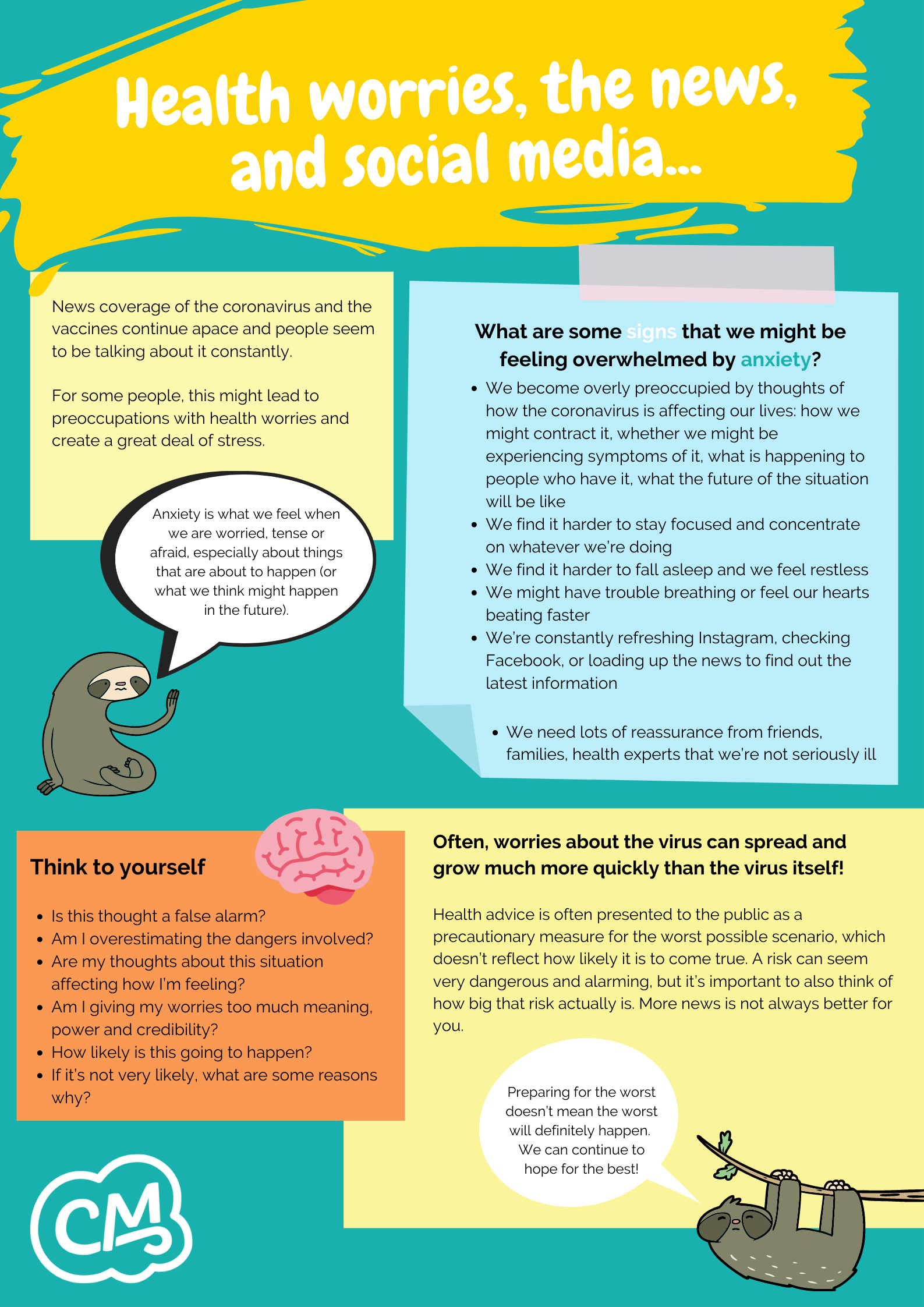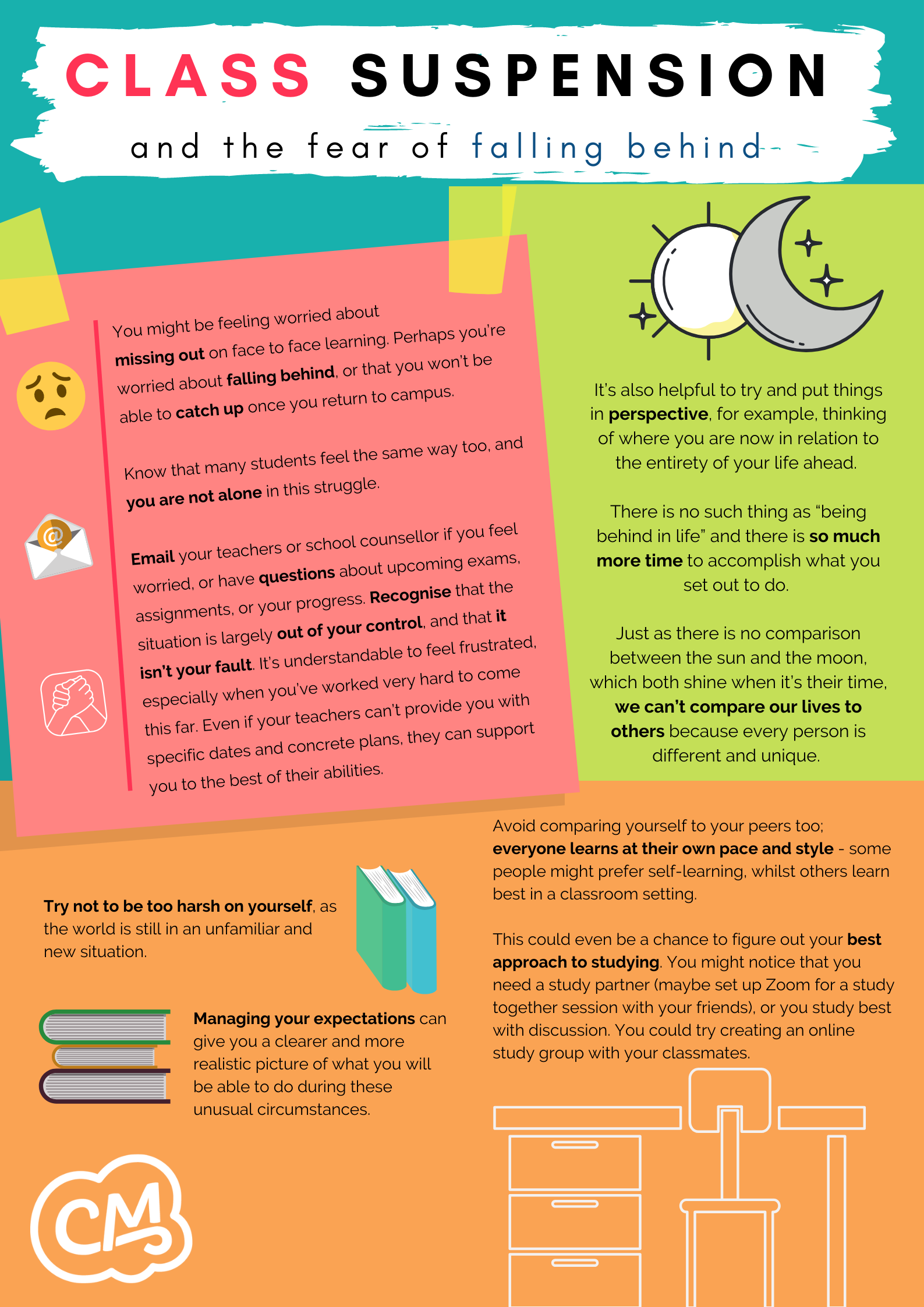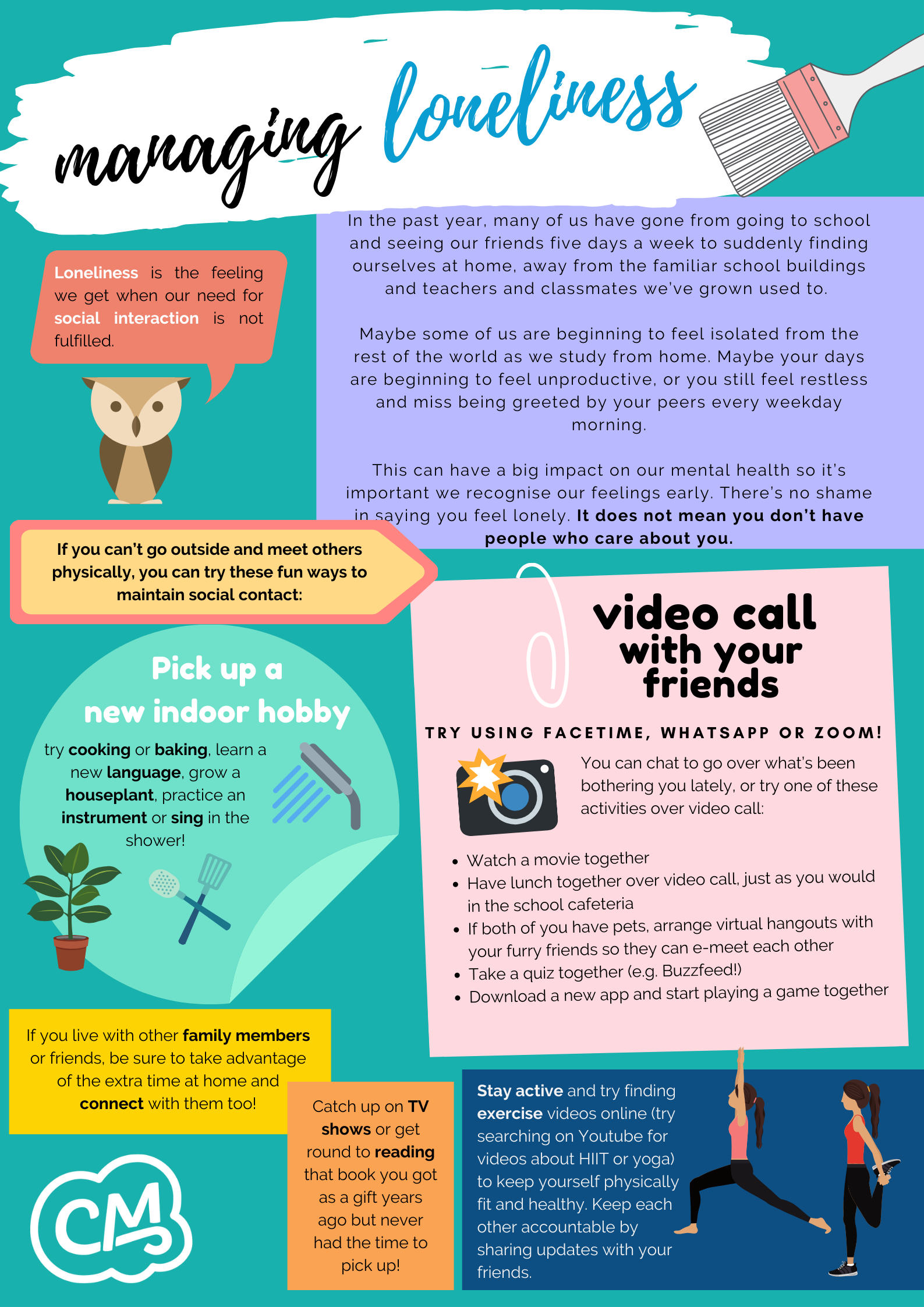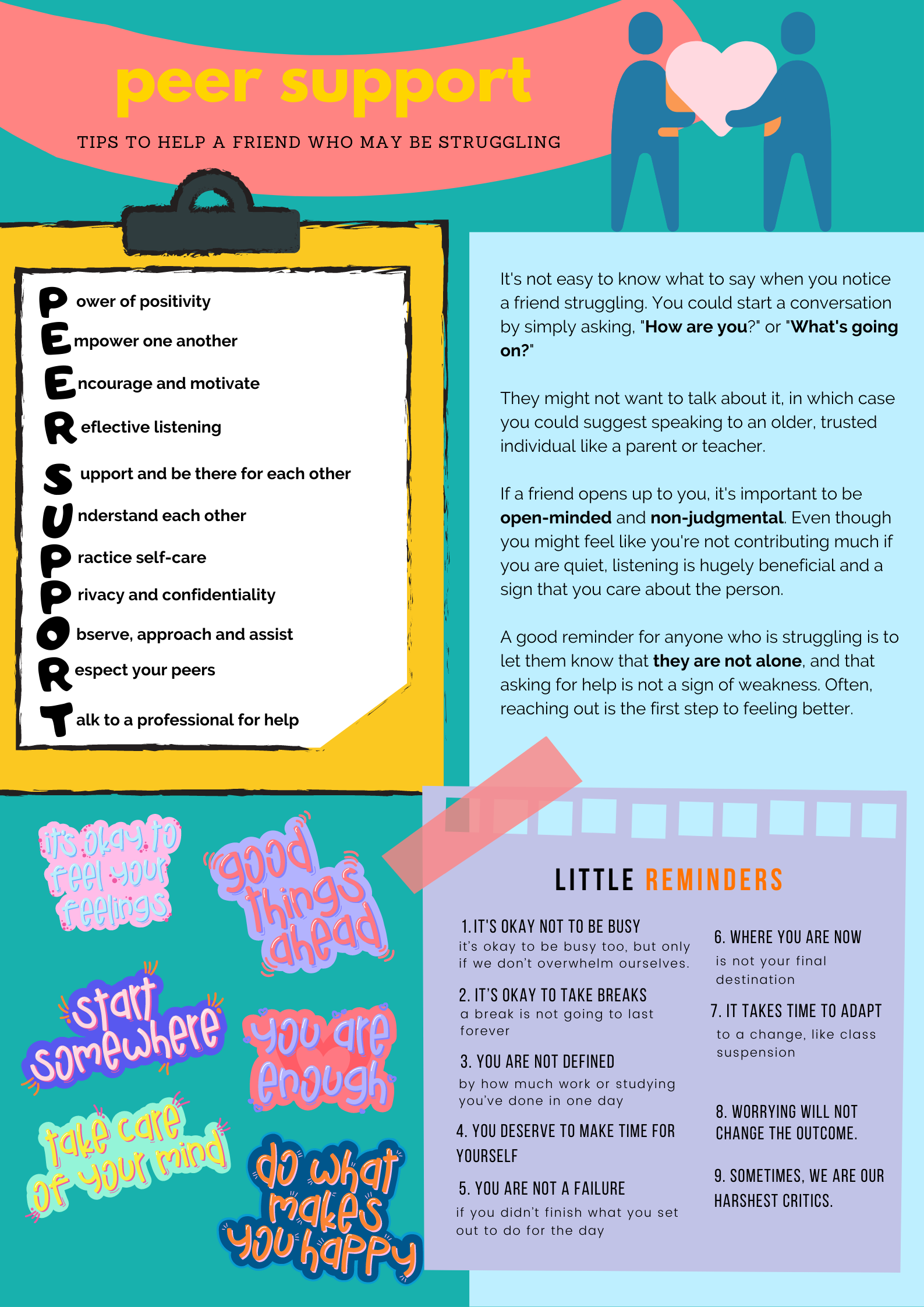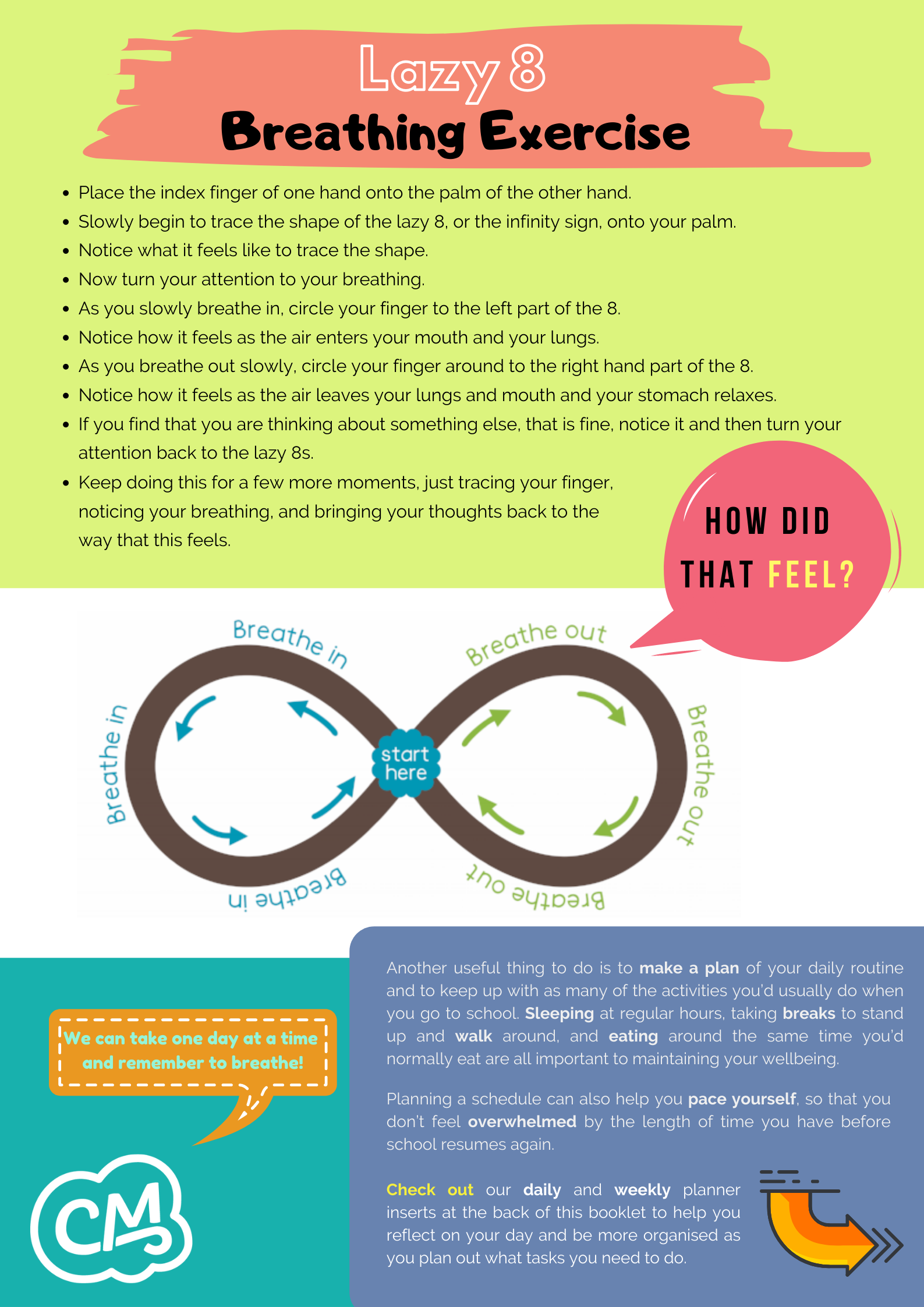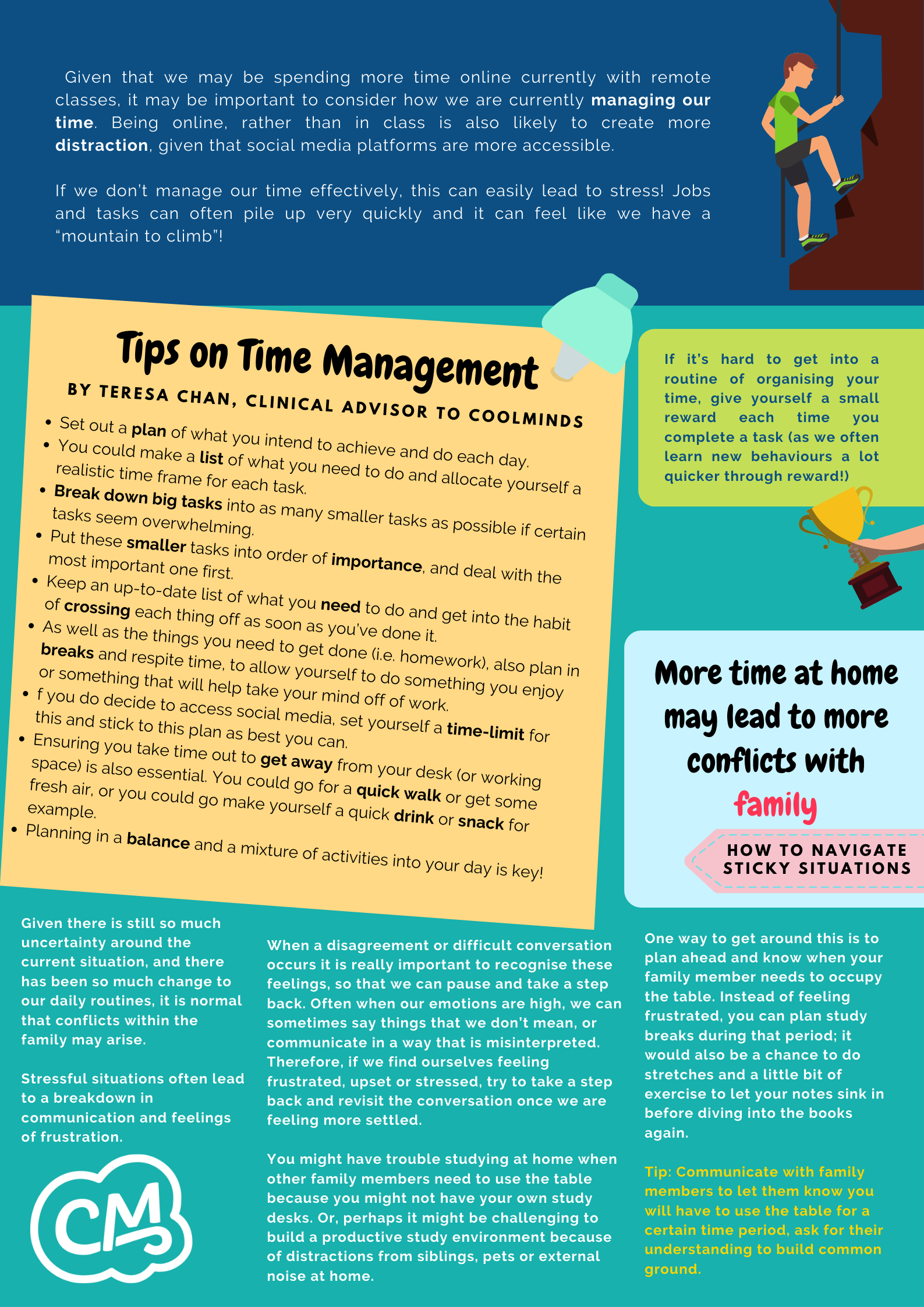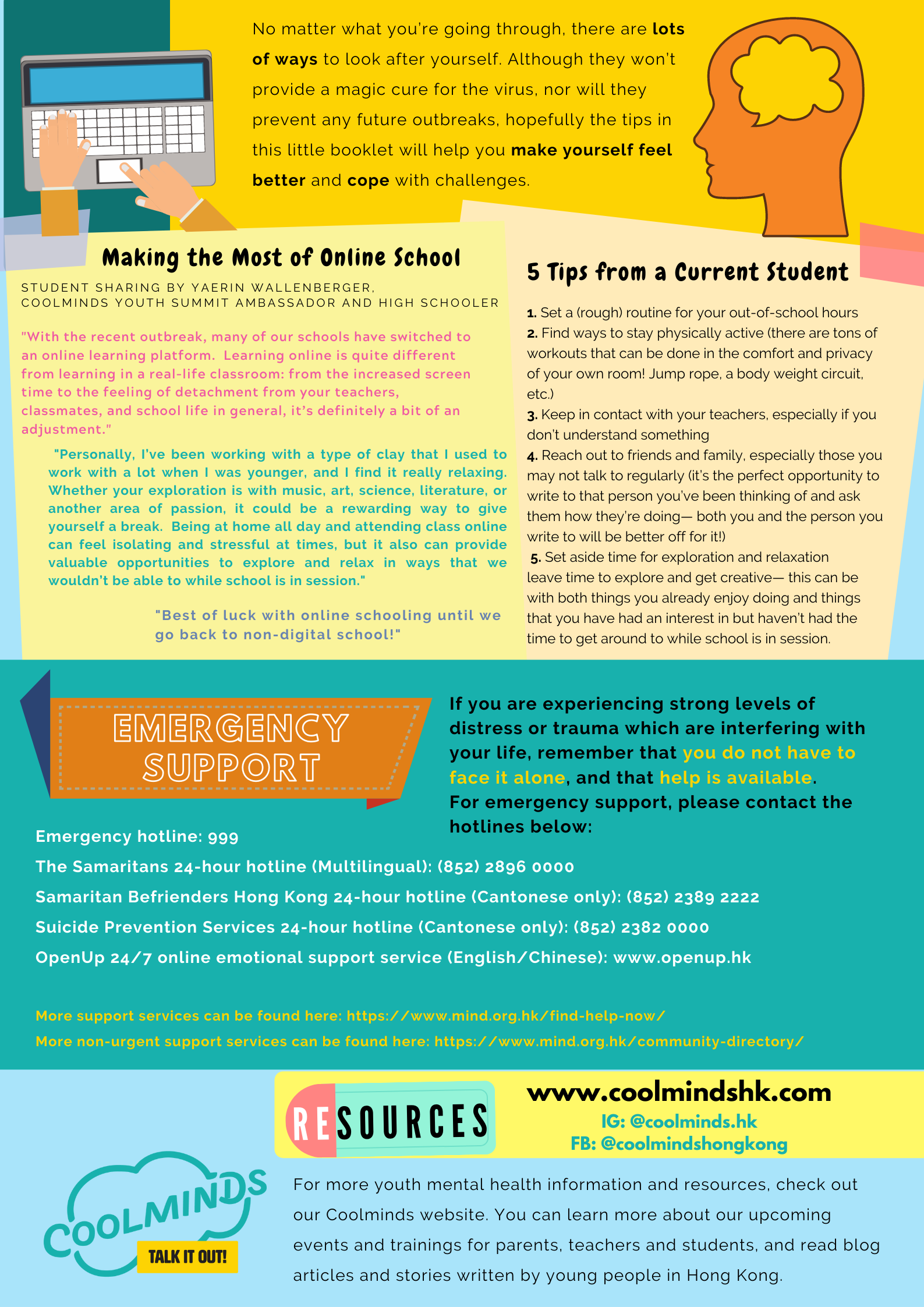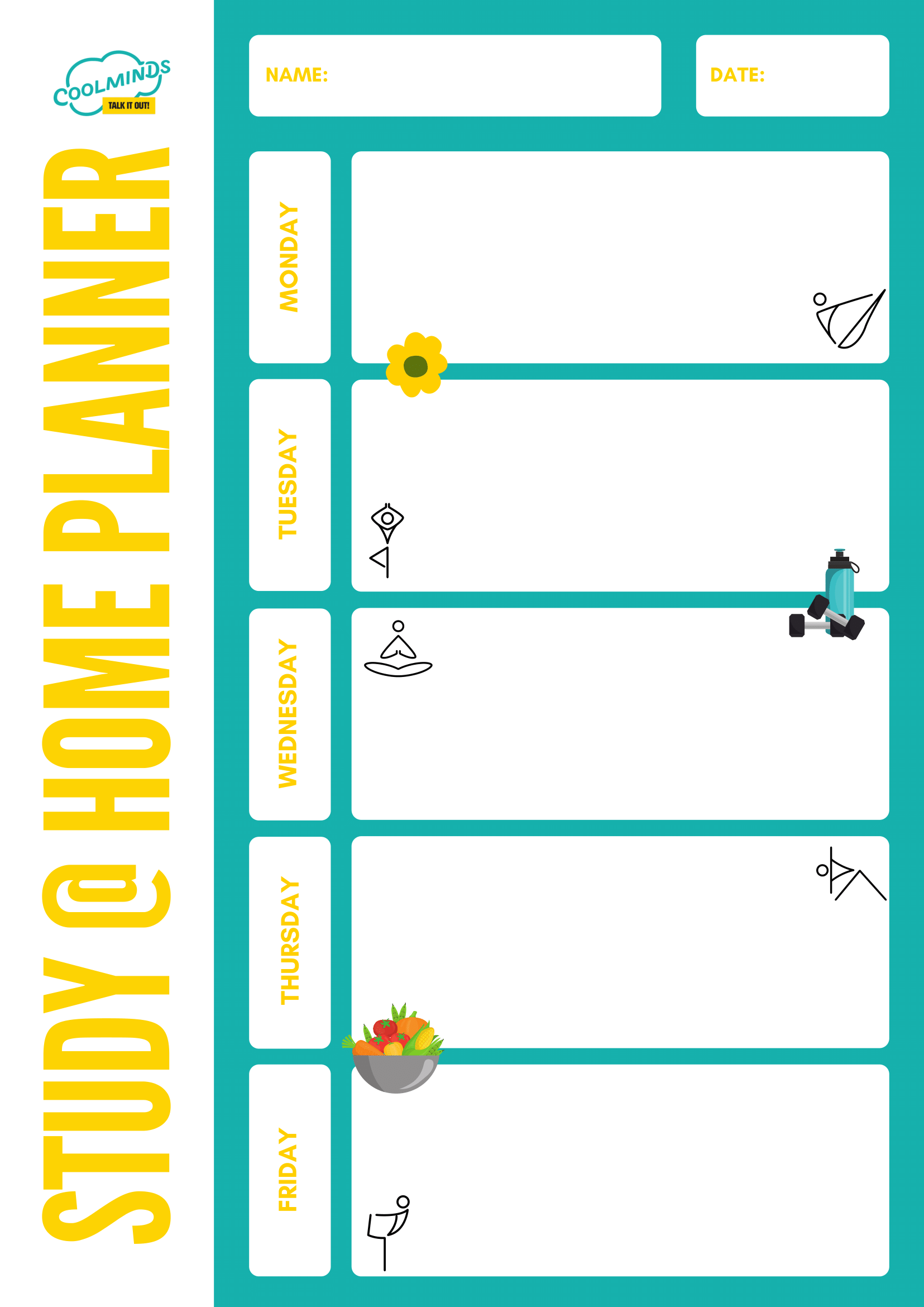With school cancelled and lots of news coverage on the coronavirus and its effects, it’s easy to feel overwhelmed. Whether you’re feeling anxious, lost, frustrated, or lonely, know that you are not alone. Experiencing these emotions are an understandable result of the current situation, and there are many ways to cope.
Health worries, the news, and social media…
Lately, there’s been tons of coronavirus coverage in the media and people seem to be talking about it constantly.
For some people, this might lead to preoccupations with health worries and create a great deal of stress.
Anxiety is what we feel when we are worried, tense or afraid, especially about things that are about to happen (or what we think might happen in the future).
What are some signs that we might be feeling overwhelmed by anxiety?
- We become overly preoccupied by thoughts of how the coronavirus is affecting our lives, how we might contract it, whether we might be experiencing symptoms of it, what is happening to people who have it, what the future of the situation will be like
- We find it harder to stay focused and concentrate on whatever we’re doing
- It also gets harder to fall asleep and we feel restless
- We might have trouble breathing or feel our hearts beating faster
- We’re constantly refreshing Instagram, checking Facebook, or loading up the news to find out the latest information
- We need lots of reassurance from friends, families, health experts that we’re not seriously ill
Think to yourself
- Is this thought a false alarm?
- Am I overestimating the dangers involved?
- Are my thoughts about this situation affecting how I’m feeling?
- Am I giving my worries too much meaning, power and credibility?
- How likely is this going to happen?
- If it’s not very likely, what are some reasons why?
Often, worries about the virus can spread and grow much more quickly than the virus itself!
Health advice is often presented to the public as a precautionary measure for the worst possible scenario, which doesn’t reflect how likely it is to come true. A risk can seem very dangerous and alarming, but it’s important to also think of how big that risk actually is. More news is not always better for you.
Preparing for the worst doesn’t mean the worst will definitely happen. We can continue to hope for the best!
Social media can be a good way to stay in touch with friends and classmates during the school suspension, but lately there has been a lot of extreme news and speculation that have contributed to an atmosphere of fear.
Reading up on the news and being surrounded by constant updates may even potentially add to our worries. And since our physical and mental health are linked, stress can impact our immune systems and make us more vulnerable to becoming physically ill. That’s why it’s a good idea to take regular breaks from social media and switch off from the news.
You should try to find reliable news sources (such as medical websites and health associations like the WHO) rather than trusting social media posts or updates that do not specify where they got their information from.
It’s important to remember that not everything we read online may be accurate or true.
If your friends or followers keep sending you messages that make you feel scared, worried, or upset, you can ask them to please stop or explain that it isn’t healthy for you.
You have the right to choose what you want to engage with!
It’s also tough if you feel like you’re being expected to be online all the time now that many schools have moved over to online teaching. An unintended consequence may be that you might feel pressured to stay connected on social media all the time.
Remember to take some time to wind down after a long time of looking at the screen. Even if your teacher has set you online work, you are not expected to be spending every minute of your day sitting in front of the computer! Just as you would with “normal” school, you are allowed to take a break offline.
Tip: Draw a fine line between study and breaks, both online and offline.
Quick and easy ways to reduce your social media use
- Switch off notifications from your apps
- Turn on airplane mode
- Hide apps in folders or move them away from the home screen
- Log out of your accounts so you have to log back in again each time (helps you stay mindful of whether you actually want to go online, or if you’re just passing time!)
- Monitor how many minutes you’re spending online each day and keep a record
Class suspension and the fear of falling behind
You might be feeling worried about missing out on face to face learning. Perhaps you’re worried about falling behind, or that you won’t be able to catch up once you return to campus.
Know that many students feel the same way too, and you are not alone in this struggle.
Email your teachers or school counsellor if you feel worried, or have questions about upcoming exams, assignments, or your progress. Recognise that the situation is largely out of our control, and that it isn’t our fault. It’s understandable to feel frustrated, especially when we’ve worked very hard to come this far. Even if your teachers can’t provide you with specific dates and concrete plans, they can support you to the best of their abilities.
It’s also helpful to try and put things in perspective, for example, thinking of where you are now in relation to the entirety of your life ahead.
There is no such thing as “being behind in life” and there is so much more time to accomplish what you set out to do.
Just as there is no comparison between the sun and the moon, which both shine when it’s their time, we can’t compare our lives to others because every person is different and unique.
Try not to be too harsh on yourself, as you’re experiencing an unfamiliar and new situation.
Managing your expectations can give you a clearer and more realistic picture of what you will be able to do during these unusual circumstances.
Avoid comparing yourself to your peers too; everyone learns at their own pace and style – some people might prefer self-learning, whilst others learn best in a classroom setting.
This could even be a chance to figure out your best approach to studying. You might notice that you need a study partner (maybe set up Zoom for a study together session with your friends), or you study best with discussion. You could try creating an online study group with your classmates.
Managing loneliness
Loneliness is the feeling we get when our need for social interaction is not fulfilled.
In the past few weeks many of us have gone from going to school and seeing our friends five days a week to suddenly finding ourselves at home, away from the familiar school buildings and teachers and classmates we’ve grown used to.
Maybe some of us are beginning to feel isolated from the rest of the world as we study from home. Maybe your days are beginning to feel unproductive, or you feel restless and miss being greeted by your peers every weekday morning.
This can have a big impact on our mental health so it’s important we recognise our feelings early. There’s no shame in saying you feel lonely. It does not mean you don’t have people who care about you.
If you can’t go outside and meet others physically, you can try these fun ways to maintain social contact:
- Pick up a new indoor hobby
Try cooking or baking, learn a new language, grow a houseplant, practice an instrument or sing in the shower!
- Video call with your friends
Try using Facetime, Whatsapp or Zoom!
You can chat to go over what’s been bothering you lately, or try one of these activities over video call:
- Watch a movie together
- Have lunch together over video call, just as you would in the school cafeteria
- If both of you have pets, arrange virtual hangouts with your furry friends so they can e-meet each other
- Take a quiz together (e.g. Buzzfeed!)
- Download a new app and start playing a game together
If you live with other family members or friends, be sure to take advantage of the extra time at home and connect with them too!
Catch up on TV shows or get round to reading that book you got as a gift years ago but never had the time to pick up!
Stay active and try finding exercise videos online (try searching on Youtube for videos about HIIT or yoga) to keep yourself physically fit and healthy. Keep each other accountable by sharing updates with your friends.
Peer support
Tips to help a friend who may be struggling
- Power of positivity
- Empower one another
- Encourage and motivate
- Reflective listening
- Support and be there for each other
- Understand each other
- Practice self-care
- Privacy and confidentiality
- Observe, approach and assist
- Respect your peers
- Talk to a professional for help
It’s not easy to know what to say when you notice a friend struggling. You could start a conversation by simply asking, “How are you?” or “What’s going on?“
They might not want to talk about it, in which case you could suggest speaking to an older, trusted individual like a parent or teacher.
If a friend opens up to you, it’s important to be open-minded and non-judgmental. Even though you might feel like you’re not contributing much if you are quiet, listening is hugely beneficial and a sign that you care about the person.
A good reminder for anyone who is struggling is to let them know that they are not alone, and that asking for help is not a sign of weakness. Often, reaching out is the first step to feeling better.
Little reminders
- It’s okay not to be busy
It’s okay to be busy too, but only if we don’t overwhelm ourselves.
- It’s okay to take breaks
A break is not going to last forever
- You are not defined by how much work or studying you’ve done in one day
- You deserve to make time for yourself
- You are not a failure if you didn’t finish what you set out to do for the day
- Where you are now is not your final destination
- It takes time to adapt to a change, like the current class suspension
- Worrying will not change the outcome
- Sometimes, we are our harshest critics
Lazy 8 Breathing Exercise
- Place the index finger of one hand onto the palm of the other hand.
- Slowly begin to trace the shape of the lazy 8, or the infinity sign, onto your palm.
- Notice what it feels like to trace the shape.
- Now turn your attention to your breathing.
- As you slowly breathe in, circle your finger to the left part of the 8.
- Notice how it feels as the air enters your mouth and your lungs.
- As you breathe out slowly, circle your finger around to the right hand part of the 8.
- Notice how it feels as the air leaves your lungs and mouth and your stomach relaxes
- If you find that you are thinking about something else, that is fine, notice it and then turn your attention back to the lazy 8s.
- Keep doing this for a few more moments, just tracing your finger, noticing your breathing, and bringing your thoughts back to the way that this feels.
We can take one day at a time and remember to breathe!
Another useful thing to do is to make a plan of your daily routine and to keep up with as many of the activities you’d usually do when you go to school. Sleeping at regular hours, taking breaks to stand up and walk around, and eating around the same time you’d normally eat are all important to maintaining your wellbeing.
Planning a schedule can also help you pace yourself, so that you don’t feel overwhelmed by the length of time you have before school resumes again.
Check out our daily and weekly planner inserts at the back of this booklet to help you reflect on your day and be more organised as you plan out what tasks you need to do.
Given that we may be spending more time online currently, as most classes are being held remotely, it may be important to consider how we are currently managing our time. Being online, rather than in class is also likely to create more distraction, given that social media platforms are more accessible.
If we don’t manage our time effectively, this can easily lead to stress! Jobs and tasks can often pile up very quickly and it can feel like we have a “mountain to climb”!
Tips on Time Management
By Teresa Chan, Clinical Advisor to Coolminds
- Set out a plan of what you intend to achieve and do each day.
- You could make a list of what you need to do and allocate yourself a realistic time frame for each task.
- Break down big tasks into as many smaller tasks as possible if certain tasks seem overwhelming.
- Put these smaller tasks into order of importance, and deal with the most important one first.
- Keep an up-to-date list of what you need to do and get into the habit of crossing each thing off as soon as you’ve done it.
- As well as the things you need to get done (i.e. homework), also plan in breaks and respite time, to allow yourself to do something you enjoy or something that will help take your mind off of work.
- If you do decide to access social media, set yourself a time-limit for this and stick to this plan as best you can.
- Ensuring you take time out to get away from your desk (or working space) is also essential. You could go for a quick walk or get some fresh air, or you could go make yourself a quick drink or snack for example.
- Planning in a balance and a mixture of activities into your day is key!
If it’s hard to get into a routine of organising your time, give yourself a small reward each time you complete a task (as we often learn new behaviours a lot quicker through reward!)
More time at home may lead to more conflicts with family
How to navigate sticky situations
Given there is still so much uncertainty around the current situation, and there has been so much change to our daily routines, it is normal that conflicts within the family may arise.
Stressful situations often lead to a breakdown in communication and feelings of frustration.
When a disagreement or difficult conversation occurs it is really important to recognise these feelings, so that we can pause and take a step back. Often when our emotions are high, we can sometimes say things that we don’t mean, or communicate in a way that is misinterpreted. Therefore, if we find ourselves feeling frustrated, upset or stressed, try to take a step back and revisit the conversation once we are feeling more settled.
You might have trouble studying at home when other family members need to use the table because you might not have your own study desks. Or, perhaps it might be challenging to build a productive study environment because of distractions from siblings, pets or external noise at home.
One way to get around this is to plan ahead and know when your family member needs to occupy the table. Instead of feeling frustrated, you can plan study breaks during that period; it would also be a chance to do stretches and a little bit of exercise to let your notes sink in before diving into the books again.
Tip: Communicate with family members to let them know you will have to use the table for a certain time period, ask for their understanding to build common ground.
No matter what you’re going through, there are lots of ways to look after yourself. Although they won’t provide a magic cure for the virus, nor will they prevent any future outbreaks, hopefully the tips in this little booklet will help you make yourself feel better and cope with challenges.
Making the Most of Online School
Student sharing by Yaerin Wallenberger, Coolminds Youth Summit Ambassador and High Schooler
“With the recent outbreak, many of our schools have switched to an online learning platform. Learning online is quite different from learning in a real-life classroom: from the increased screen time to the feeling of detachment from your teachers, classmates, and school life in general, it’s definitely a bit of an adjustment.”
“Personally, I’ve been working with a type of clay that I used to work with a lot when I was younger, and I find it really relaxing. Whether your exploration is with music, art, science, literature, or another area of passion, it could be a rewarding way to give yourself a break. Being at home all day and attending class online can feel isolating and stressful at times, but it also can provide valuable opportunities to explore and relax in ways that we wouldn’t be able to while school is in session.”
“Best of luck with online schooling until we go back to non-digital school!”
5 Tips from a Current Student
- Set a (rough) routine for your out-of-school hours
- Find ways to stay physically active (there are tons of workouts that can be done in the comfort and privacy of your own room! Jump rope, a body weight circuit, etc.)
- Keep in contact with your teachers, especially if you don’t understand something
- Reach out to friends and family, especially those you may not talk to regularly (it’s the perfect opportunity to write to that person you’ve been thinking of and ask them how they’re doing— both you and the person you write to will be better off for it!)
- Set aside time for exploration and relaxation leave time to explore and get creative— this can be with both things you already enjoy doing and things that you have had an interest in but haven’t had the time to get around to while school is in session.
Emergency support
If you are experiencing strong levels of distress or trauma which are interfering with your life, remember that you do not have to face it alone, and that help is available.
For emergency support, please contact the hotlines below:
Emergency hotline: 999
The Samaritans 24-hour hotline (Multilingual): (852) 2896 0000
Samaritan Befrienders Hong Kong 24-hour hotline (Cantonese only): (852) 2389 2222
Suicide Prevention Services 24-hour hotline (Cantonese only): (852) 2382 0000
OpenUp 24/7 online emotional support service (English/Chinese): www.openup.hk
More support services can be found here: https://www.coolmindshk.com/en/emergency-hotlines/
More non-urgent support services can be found here: https://www.coolmindshk.com/en/communitydirectory/





